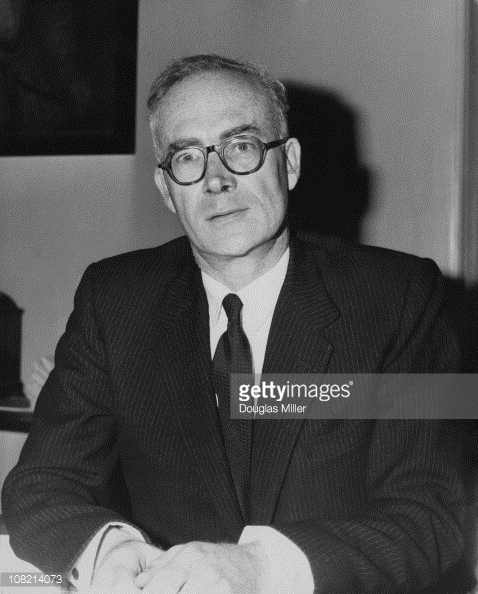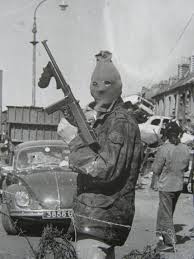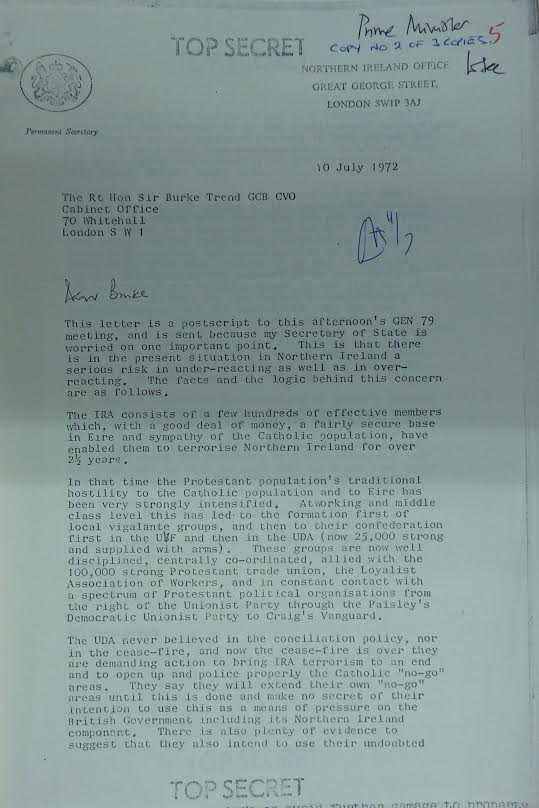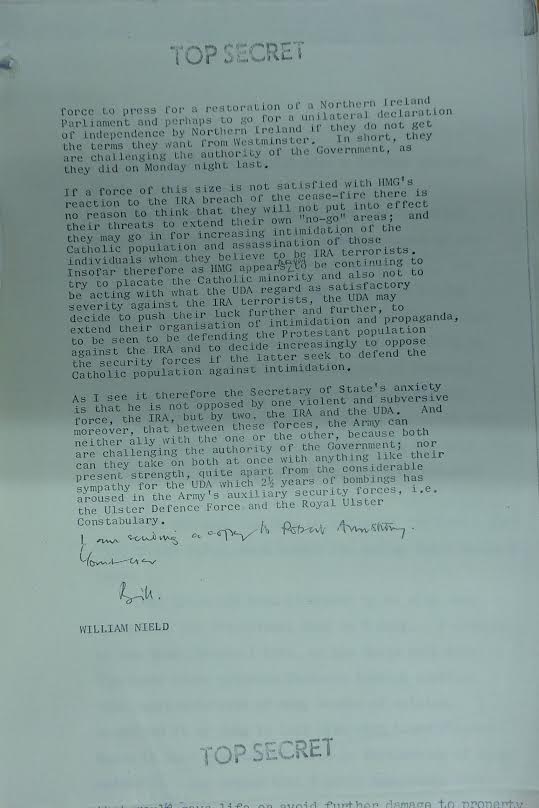Over the next two or three days, thebrokenelbow.com will make available documents and material that featured in RTE’s recent documentary ‘Collusion’, which dealt with the lengthy and tangled story of British security force alliances with, cum toleration of Loyalist violence.
The first of these documents, discovered by James Kinchin-White at the Kew archive, is a letter written by the Permanent-Secretary at the Northern Ireland Office, William (later Sir William) Nield to the British Cabinet Secretary, Sir Burke Trend and copied to Sir Robert Armstrong, Secretary to the then British prime minister, Edward Heath.
 |
| Sir Burke Trend, Heath’s Cabinet Secretary |
(It was also written as UDA pressure on the British to dismantle the no-go areas of Derry was being ratcheted up. The IRA ceasefire had ended, the Provos were back to war and the Loyalists were threatening to escalate their violence unless the British invaded the Bogside, Creggan and other Republican areas.)
The Ulster Defence Association, which had successfully confronted British troops in the middle of the Shankill Road just a few days later, was opposed to this re-housing effort and the response of the British Army in repulsing the Republican cavalcade, was seen widely in Catholic communities as indicative of the British taking the side of Loyalists.
The significance of the Nield letter is that it puts all this into words and the implied policy conclusion, that the British would concentrate their firepower on the IRA rather than the UDA, would characterise British policy in ensuing years.
 |
| Sir Robert Armstrong, Heath’s private secretary. He would later become famous for coining the phrase ‘economical with the truth’. |
Nield writes to express the concerns – he uses the word ‘anxiety’ – felt by his Secretary of State, William Whitelaw at the prospect of the British being faced by both the IRA and the UDA, two well armed forces, in the period following the ceasefire breakdown and concludes:
…..nor can they take on both at once with anything like their present strength, quite apart from the considerable sympathy for the UDA which 2 1/2 years of bombings has aroused in the Army’s auxiliary security forces, i.e. the Ulster Defence Force (sic) and the Royal Ulster Constabulary.
 |
| An IRA checkpoint in Derry, behind the barricades that made much of the city a no-go area for British forces |
The next document we publish, the so-called Tuzo plan, takes this thinking to its next logical step and introduces the idea of using the UDA as an ally in the war against the IRA.
The implication in the Nield letter is clear: we can’t fight on two fronts, the UDA is much bigger than the IRA while the RUC and UDR (not UDF as Nield called it) sympathise with Loyalist paramilitaries and if we don’t do something to satisfy the UDA, like taking on the no-go areas controlled by the IRA, we’ll be in serious trouble – so let’s concentrate on defeating the IRA. It was not a huge leap between that logic and the idea of using Loyalists against the IRA.
Here is the Nield letter. Click to expand and enjoy:
 |
 |






The vacant houses which the Provos intended to fill with 'Catholic refugee families' wouldn't have belonged to 'Protestant refugee families' would they by any chance?
ReplyDeleteAnyone reading that letter can see that it explicity states that "the army can neither ally with one or the other". Ed Moloney is making a mighty leap in his article with absolutely zero evidence to back it up. The letter is clearly pointing out that the army needs to actively take on the IRA's no go areas in order to reduce the legitimacy of the UDA in the loyalist community, and the subsequent threat of them establsihing no go areas. It is absolutey not suggesting taking sides with the UDA.
Don't see much in that myself. There was obviously a natural alliance with the loyalists politically but the document can hardly be described as a smoking gun. It would have surely made sense to contain the smaller anti state IRA of an estimated few hundred than to irresponsibly let scores of thousands of loyalists and UDR RUC go berserk would it not? Though they fucked all that up too with the Falls curfew and over zealous approach God love them.
ReplyDeleteCue Bono & Larry Hughes
ReplyDeleteYou both give a new spin on the origins of the sectarian state and the occupation of Ireland generally -it did not just come about as tactical maneuver of crisis management between 2 factions in 1972.
When Internment was introduced exclusively against nationalists and if any IRA members were arrested was purely by accident -internment was notorious for its aggressive selection of Nationalists only. This letter merely confirms a consistent policy of aggression against nationalists long before there ever was a UDA.
The UDA's main source of weaponry and intelligence came directly from the Security Forces. If we go along with your logic, do either of you honestly think that if the IRA was the stronger of the 2 groups they would have helped the IRA instead??
tiarna
ReplyDeleteI remember as a child my grandmother stating the British army was initially ignorant of the realities in the wee 6. There was the much stated 'honeymoon period' with cups of tea etc. Stormont introduced internment within minutes of WW2 being declared and the wee 6 was notoriously lack lustre and 'out' of the war. So, it was no different during the demand for civil rights and whilst Stormont was rotten, the Brits were initially weighing up options. Of course internment, Ballymurphy and Derry quickly saw the colonial pony resorting to its only trick.
Larry
ReplyDeleteIt makes sense to you not "to irresponsibly let scores of thousands of loyalists and UDR RUC go berserk would it not?" You think backing them and arming them 'responsibly' was fair practice for a peace keeping force (Brits stated objective) between 2 sides?
Written evidence of acquiescing or colluding with loyalists is a smoking gun and the more of it the better -they have denied collusion for decades it is not so easy to do that when their officials document it.
Larry PS: The British Army was ignorant of the realities in Ireland for centuries because they did what the wanted and the Irish would like it or lump it -that's a lame excuse for oppression, Would you excuse slavery the same way because slave traders were ignorant of Africa?
ReplyDeletetiarna,
ReplyDeleteYou are being disingenuous when you describe internment as being launched against nationalists. It was launched against the IRA and I think that Anthony will confirm that the vast majority of those interned in the republican cages were indeed active Provos. Why did the Brits concentrate on the IRA? Because the Provos were trying to destroy the place and were responsible for the bulk of the violence. The police had been replaced by the army in republican areas at the insistence of republicans, so they received the blunt end of the army boot, when they started killing soldiers, whilst the police concentrated on loyalist crime.
The Brits have long conceded to Internment being a failure because the IRA knew they were coming and not available for capture -so no I was not being disingenuous -Yes it was to intimate and terrorize the nationalist community just as loyalists violence was -claiming to be targeting the IRA has never justified their targeting of civilians.
ReplyDeleteAs for the violence -peaceful civil rights marchers were savagely and violently beaten off the streets by followers of 'non-peaceful' Unionism, and Unionists have been whinging ever since because the pesky Fenians bastards fought back when they should have laid down and taken it.
Tiarna,
ReplyDeleteYou use the old republican tactic of using a little bit of truth and weaving it into a big lie. The initial internment sweeps were a failure because the intelligence it was based on was flawed and the wrong people were lifted. After that they started to lift the right people,and it was hurting the Provos badly. Their campaign received a massive boost when the internees were released to start killing again. It had absolutely nothing to do with terrorising the nationalist community.
If you think that thirty five years of murder, and the deaths of three and half thousand people, is a proportionate response to some marchers being beaten up then I think that perhaps you need to take a look at yourself.
Cuo Bono
ReplyDeleteYou indicated the that IRA started the violence -I pointed out that the violence originated with unionism (they just beat a few pesky Fenians up) -oh, you picked up on the miniscule IRA pre-internment to the deadly post-internment organisation it became. Yeah that did back fire a bit didn't it!
If you think that thirty five years of murder, and the deaths of three and half thousand people, is a proportionate response to peaceful civil rights marchers then I think that perhaps you need to take a look at yourself.
Cue Bono
ReplyDeleteUnionist supremacy and hatred of Catholics/nationalists existed regardless of the existence,never mind activities, of the IRA. If there never had been any IRA -Unionists would still hate Catholics/nationalists, discriminate against them and every 12th July kill their token taigs. Unionist Supremacy was probably never going to be stopped but for the resort of violence.
Not only did Unionists inflict violence on peaceful marchers -the British Army and Loyalists were in competition of who could kill the most and get away with it -McGurks Bar, Ballymurphy Massacre, Kelly's Bar, Bloody Sunday... and you're here to yap about the monster that those things created? Damn right nationalists fought back.
tiarna
ReplyDeleteI don't disagree with what you say. Was just pointing out what was being bandied about at the time. The civil rights issue was hijacked by republicans in a bid to destroy norn iron. All they had to do was enter Stormont and fuck the place up completely without firing a shot like now lol The shithole wasn't worth a single life-er.